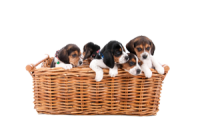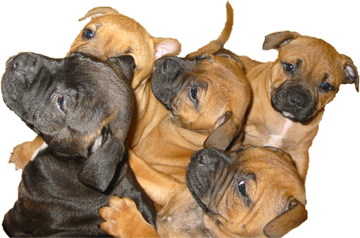A puppy’s world is turned upside down when you take her away from her litter mates and parents. Her mother guided her behaviour and her siblings helped her sort out the rules for life. She was used to her environment and had constant companionship.
Now you are that puppy’s world! You are responsible for her well being and are her prime companion. She looks to you for guidance and expects you to set the rules.
Your puppy may be living with your family for the next 15 years, and what she learns in the first few weeks will determine her behaviour for the rest of her life.
Start the way you wish to continue, be consistent in your expectations and commands and involve all family members in making and keeping the rules for your pup. Encourage children to be calm near the puppy.
Encourage desirable behaviour with petting and a treat. Reward the pup within one and a half seconds of the desirable behaviour so she associates the behaviour with the outcome. Punishment or scolding is much less effective.
Discourage mouthing or biting behaviour. It can turn into a dangerous habit in an adult dog, particularly around small children.
Resist going to a crying pup at night. Check that she has adequate food, water and warmth and then ignore her. If you answer her cries she will keep at it. Once she realises that no one responds to her crying she should settle down.
Build your puppy’s self-confidence and ability to cope with the world so that she doesn’t need you by her side all the time. Dogs that are over-dependent on their owners develop unpleasant behaviours.
When you come home from work acknowledge your pup only when she has calmed down and given up demanding your attention. If she pushes at your hands or jumps in your lap look away, withdraw your hands or manoeuvre your body so that she cannot access your lap. When she calms down ask her to sit then pet her as a reward for the correct response.
As soon as your pup is vaccinated get her out into the big, wide world. Good experiences with all types of people, animals, situations and places are critical for healthy socialisation. From 6 to 16 weeks expose her to as many new experiences as possible. She will be less anxious and more tolerant as an adult if she has already met other dogs, cats, horses, children and other people, as well as had a ride in a car, been groomed and had a veterinary exam.
 Some breeds like border collies, kelpies or cattle dogs are very active and need lots of exercise. Other breeds have to be prised off the couch to play Frisbee or walk to the park. All dogs love a break from their own yard with their carer.
Some breeds like border collies, kelpies or cattle dogs are very active and need lots of exercise. Other breeds have to be prised off the couch to play Frisbee or walk to the park. All dogs love a break from their own yard with their carer.
Avoid off-lead dog parks until your pup is confident with other dogs. Introduce her to dogs that are on a lead and under the full control of their owners so that she doesn’t become afraid of other dogs. Allow your pup an escape route by keeping the lead loose when near other dogs or strangers. She should never feel cornered as this can trigger aggression or intimidating behaviour.
